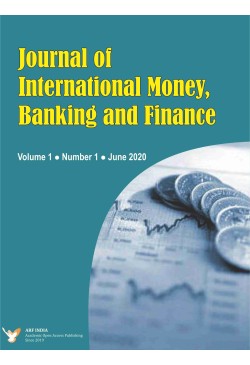
Journal of International Money, Banking and Finance
Frequency :Bi-Annual
ISSN :2582-7650
Peer Reviewed Journal
Monetary Policy, Trade Liberalization and Output Growth in Nigeria
Adigun, Abiodun O. & Oke, Dorcas F. (2023). Monetary Policy, Trade Liberalization and Output Growth in Nigeria, Journal of International Money, Banking and Finance, 4: 1, pp. 1-14. https://DOI:10.47509/JIMBF.2023.v04i01.01
Banking the Unbanked in Nigeria: The Role of Financial Technology
IWEDI, Marshal, KOCHA, Chukwuenenye EDEH, Mark Bekweri & TURAKPE, Morrison J. (2023). Banking the Unbanked in Nigeria: The Role of Financial Technology, Journal of International Money, Banking and Finance, 4: 1, pp. 15-22. https://DOI:10.47509/JIMBF.2023.v04i01.02
Credit Risk and its Management in the Banks: A Conceptual Review
Oyelakun Oyetola, Madugba Joseph, Oladipo Adenike, Adeola Omolara & Adegbile Godwin (2023). Credit Risk and its Management in the Banks: A Conceptual Review, Journal of International Money, Banking and Finance, 4: 1, pp. 23-32. https://DOI:10.47509/JIMBF.2023.v04i01.03
Contributory Pension Scheme and Human Development Index in Nigeria
Zwingina Christy Twaliwi (2023). Contributory Pension Scheme and Human Development Index in Nigeria, Journal of International Money, Banking and Finance, 4: 1, pp. 33-50. https://DOI:10.47509/JIMBF.2023.v04i01.04
Responsiveness of Nigeria’s Economic Growth to Domestic Debt in the Nigerian Economy
Chukwu, Peter Damian Ezechi, Irem Collins Okechukwu & A. Adegun (2023). Responsiveness of Nigeria’s Economic Growth to Domestic Debt in the Nigerian Economy, Journal of International Money, Banking and Finance, 4: 1, pp. 51-68. https://DOI:10.47509/JIMBF.2023.v04i01.05